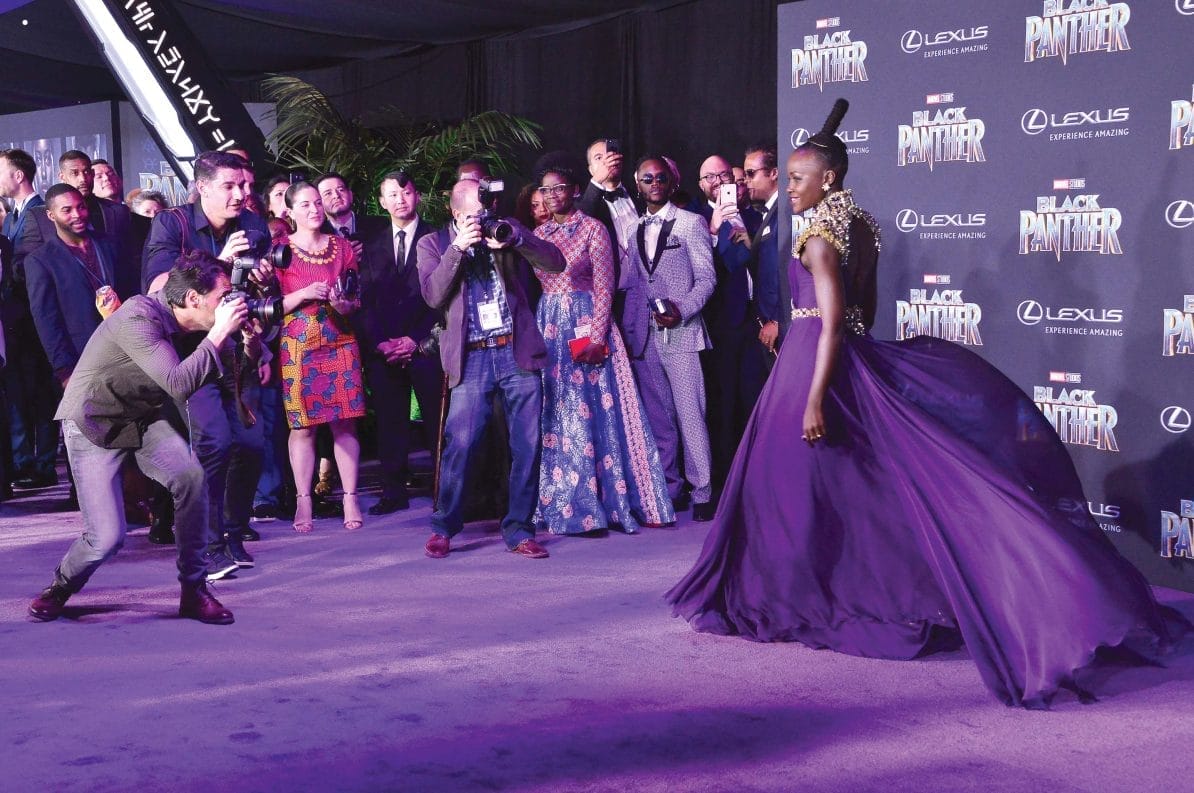Moment that mattered: Black Panther is released in cinemas
In 2018, we spoke to writer Juliana “Jewels” Smith about the much-anticipated release of superhero blockbuster Black Panther

Black Panther actor Lupita Nyong’o photographed at the film’s world premiere in Hollywood. Photo: Sthanlee B. Mirador/Sipa USA
12th February 2018 (Taken from: #30)
This article was published in Delayed Gratification in June 2018
It’s hard to remember a film reaching the big screen with so much resting on its shoulders.
Black Panther, a film about an African prince who gains superhuman powers when he wears a suit made from a meteorite, had been heralded as the solution to Hollywood’s Africa problem (The Guardian), the moment culture has been waiting for (Variety) and the cinematic answer to Black Lives Matter (CNN). What’s more, it’s also part of the Marvel Cinematic Universe, and was expected to keep up the franchise’s run of box office hits, which have made $13.5 billion over the past ten years. It was, says Juliana “Jewels” Smith, creator of black-centred comic book (H)Afrocentric, “a lot of pressure to put on one movie”.
The film – only director Ryan Coogler’s third – delivered on every front. Earning over $1.2 billion in worldwide revenue in its first two months, it has become the highest-grossing single superhero film ever, and the ninth highest-grossing movie of all time. But according to Smith, Black Panther’s cultural impact is more important than its financial record. “There is a constant barrage of violence against black folks in the US,” she says. “Given the things that we can see on Twitter and on the news, it’s important to see ourselves portrayed in a different way. What was so important about Black Panther was that I got to see an almost all black cast in a superhero film. I’ve never seen that before.”
The film was adapted from the long-running Marvel comic book series of the same name launched in 1966. Creating the first superhero of African descent during the civil rights movement had huge symbolic significance. Some spotted a parallel with the environment in which the big-screen adaptation of Black Panther was launched: this was a positive portrayal of Africa and black people appearing at a time when the US president had labelled a group of African nations as “shithole countries”.
I got to see an almost all black cast in a superhero film. I’ve never seen that before”
The film introduced film audiences to Wakanda, an uncolonised African nation that protects itself from foreign powers that might want to steal its resources by hiding itself away from the world. “The history of European colonialism is pretty awful,” says Smith. “So it’s important to think about how an African country might have developed without the kind of violence that was introduced from European countries.”
Smith’s comic book series, (H)Afrocentric, follows four disgruntled black undergraduates as they navigate the fictitious Ronald Reagan University and deal with racism, sexism and gentrification. It is part of a growing scene of comic books that feature a diverse cast of characters, and Black Panther’s record-breaking revenue has provided hope that these stories can also reach a wider audience. “In the last five years I’ve really seen a resurgence of black-centred comic books,” Smith says. “The range of characters being written is vast – anything from vampires to little kids. There’s so much out there right now that excites me. I just want more people to be able to see it.”
Reaching more people usually involves bigger budgets and that is where Smith believes Black Panther’s box office success will filter down. “Now a studio or publisher can’t make the argument that black stories don’t sell,” she says. “That’s huge for those of us who are writing casts of colour. It really speaks volumes about how we can be marketed and how we can be seen as something worth putting money behind.”
Despite the global success of Black Panther, Smith believes there is still much further to go in the way that black people are represented in popular culture. “To be seen as a superhero is important for children. But I want to get to the point where blackness is not just seen as one thing, but as many things – in the same way that whiteness is,” she says. “We still have very limited options even though Black Panther exists. There need to be ways of showing black folks that display the mundaneness in our lives, the humour, our humanity. That’s the goal I have.”
Slow Journalism in your inbox, plus infographics, offers and more: sign up for the free DG newsletter. Sign me up
Thanks for signing up.








